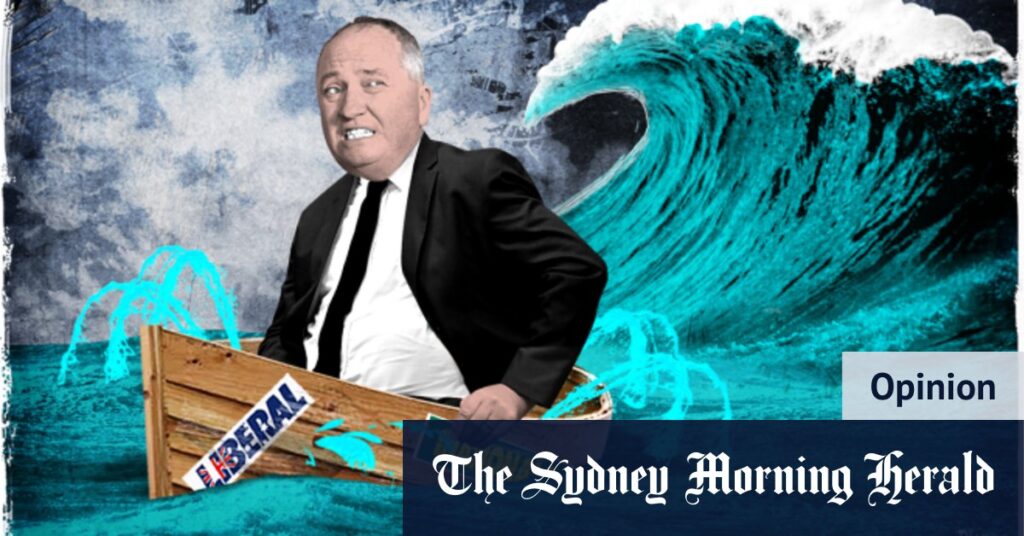“The teals will be running around telling everyone in their electorates anything they want to hear that makes them feel good at the time,” the jeremiad continues. “What they won’t be telling anyone is who they would be backing if there was a hung parliament, and they were responsible to pick one side or the other. This is the only question that they really can answer is the question they never will answer.”
Beware the teal wave, says Barnaby Joyce.Credit: Alex Ellinghausen
Once you’ve untangled that last sentence, it’s a fair enough point in theory. A hung federal parliament is likely, and it’s reasonable to ask which side your local independent would back, except that it’s too early for them to answer. They don’t know which major party would have the most seats. They don’t know which side will have policies better aligned with theirs, especially when one side doesn’t have many policies yet. The independents will make up their minds if the day of choosing comes. This discretion, presumably, is what makes them independent.
Unlike Joyce out in New England, those of us who live in independent-voting electorates are not terrified of “chaos”. The so-called teal wave is partly, but not wholly, a protest vote. It has been a repudiation of the duopoly, an expression of a desire to know what policies you are voting for, and, if your independent turns out to hold the balance of power, then all the better for those policies.
Far from voting for someone “weak and precarious” (Joyce’s words), you will have voted for someone in a position of strength. All of these fed into last week’s vote for Jacqui Scruby in Pittwater. The NSW parliament is not consequently in “chaos”, but is instead accountable to a broader spectrum of the electorate than if one major party dominated. Yes, if every parliamentarian was an independent that might be a recipe for chaos, but settle, New England petal, we’re a long way from your Italian doomsday.
The fear of accountability, which is spreading through the duopoly even faster than scurvy, is also a fear of having to take action to stop killing our planet and ourselves. The half of Joyce’s message that is not terrorised by the teals is concerned with rubbishing renewable energy. We get a fair bit about “wind and solar swindle factories”. High inflation is a result of power prices that “are going through the roof because supply has been decimated by the Peter Pan belief in intermittent power from wind towers and solar panels”.
Loading
As the talking Id of the federal Coalition, Joyce is free and welcome to say such things. He’s the one Coalition MP who publicly supported Jacinta Price’s independence after she likened late-term abortion to infanticide. He has also shown himself in the past to be sceptical about climate science. The Peter Pan policy of nuclear power is a cynical euphemism for what Tony Abbott has said about man-influenced climate change: “absolute crap” (2009), “probably doing good” (2017) and a “cult” that will be “discredited” (2023). Like Joyce, Abbott is free to say what others think.
And this, judging by our newsletter from New England, is the overriding fear. Teal independents will have the power to pressure government to do more to reach Australia’s 43 per cent emissions reduction target by 2030. If they supported Dutton, they might force him to acknowledge that his nuclear power policy is a Peter Pan fantasy which not even its authors believe, for even if it met its aims on cost and safety, it would still arrive too late. If they obtained the balance of power, the teal independents would press climate back to the top of the agenda. Chaos? Nope. Those electors who have turned teal and independent know exactly what they are voting for.
Malcolm Knox is a journalist, author and columnist for The Sydney Morning Herald.
Read the full article here
